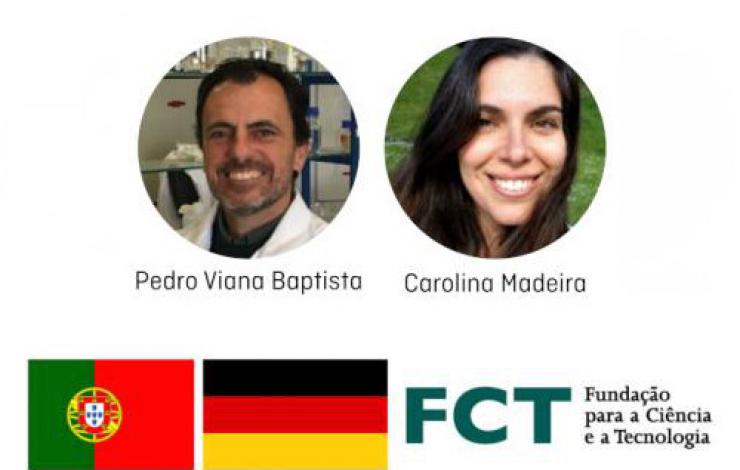11-03-2022

Carolina Madeira, researcher at the SeaTox research lab, and Pedro Viana Baptista, leader of the Nanomedicine research lab, have been awarded funding for their projects in the Programme for Cooperation in Science between Portugal and Germany. This call for joint project proposals from Portuguese and German research teams is launched by Fundação para a Ciência e Tecnologia (FCT) and the Deutscher Akademischer Austauschdienst (DAAD) for exchanging researchers within the framework of joint research projects. In the call for proposals between Portugal and DAAD for 2022/2023 there were 11 projects funded.
Carolina Madeira will work on the project “Marine molecular networks for sustainable fisheries and AQUAculture: modeling TROpical fish nutritional quality and PHYSiology under global change (AQUATROPHYS)” in cooperation with a German team from the Leibniz Zentrum für Marine Tropenforschung: ZMT Bremen. AQUATROPHYS is a capacity-building tool to promote excellence and innovation in marine science. The project will implement a Systems-Biology approach to unravel molecular networks underpinning physiological responses of commercial tropical marine fishes to global change scenarios. The main purpose is to create a permanent network of advanced training and expert exchange in experimental biology and marine omics with access to state-of-the-art infrastructures. “We will model fish nutritional quality and stress profiles under forecasted scenarios and relate them with life histories to identify key actionable targets at the molecular scale for fish phenotype prediction and design, with the aim of assessing fish stocks quality and improving aquaculture production.”, explains Carolina, a Scientific Employment Stimulus - Junior Researcher at the SeaTox research lab. By turning fundamental and applied research into knowledge-intensive training programs, the project will potentiate science output and expertise, altogether essential to develop climate-smart policies for sustainable fisheries and aquaculture in areas such as tropical seas that are particularly vulnerable.
Pedro Viana Baptista will develop the project “Spectroscopic characterization of bioconjugated gold nanoparticles” in cooperation with a German team from the Leibniz Institute of Photonic Technology. The use of nanomaterials has been having a great impact in biosensing. In particular, the unique properties of noble metal nanoparticles have allowed for the development of new biosensing platforms with enhanced capabilities in the specific detection of bioanalytes. A key step in these applications is the biofunctionalization of the metal nanostructures with biomolecules to recognize the target analyte. Although numerous approaches and protocols have been developed for functionalization of metal nanoparticles, this is still a critical step, and not always successful, requiring laborious tests and analytics to guarantee reproducibility of the subsequent assays. In this application, an innovative streamlined approach will be developed to characterize the biofunctionalization. “We shall tackle this issue via a two-prong strategy: i) a 2-LED spectrophotometer will be adjusted allow batch-wise monitoring of modified nanoparticle solutions without the need for desktop UV/VIS spectrometers; and ii) this spectroscopic approach shall be incorporated into a flow-through evaluation with the possibility for sorting (separating sufficiently modified from unmodified ones). As result, we shall develop a prototype chip solution for the fast and routine monitoring of nanoparticle modification with biomolecules for application in biomedicine”, explains Pedro Viana Baptista, full professor at the Department of Life Sciences - FCT NOVA and leader of the Nanomedicine research lab.